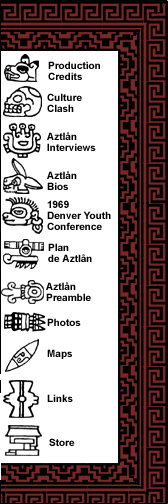

IN SEARCH OF AZTLÁN
José Angel Gutiérrez Interview
August 8, 1999
Q: What does the word "Aztlán"mean?
A: To me it’s a dream. It’s a vision. It’s an extraordinary
goal that we pursued during the times of activism that I was involved
in. And it’s a search for mi corazon, because Aztlán is part
of us. It’s that legacy of being dismembered as a homeland. The United
States came to us. We became a different citizen. But we never lost that
hope and that search and that vision for putting back together our homeland.
Q: Why was Aztlán so important in the sixties?
A: We took the concept of Aztlán--the myth the story the vision
the hope the search--and used it as a political goal. Our numbers [were]
not what they are today, but they were beginning to [be] in certain parts,
particularly south Texas, where I’m from. And we built a political
party and a political program that said we were going to build Aztlán
here.
I worked in the Wintergarden area, in Crystal, Texas--or Tej-Aztlán
as we used to call it. We built an empowerment movement that took control
of our political and social and economic destiny. We built a political
party, El Partido La Raza Unida, and proceeded to become the governors,
established political sovereignty, creating Aztlán. People in seventeen
other states plus the District of Columbia, bought into that same vision
and goal and political agenda, and did the same thing in other places.
In California, in Cucamonga, in Parleer, in walkouts with the students,
in New Mexico, in Arizona, in Chicago--even in Washington D.C. All with
the goal of building Aztlán--a nation within this nation.
Q: Does the concept of Aztlán have anything to do with Mexico?
A: Aztlán is one half of the one Mexico that we need to build.
This is the Mexico on the other side, north of the Rio Grande, El Rio
Bravo. We have been dismembered since 1826 in Texas, and 1848 in the rest
of the Southwest. And then after 1853 in La Mesia, from Tucson to the
border of California. So the mission of Aztlán is to put back together
the original land where our ancestors came from. So our movement, then,
has everything to do with the Mexico that exists. And that is, to make
it bigger, to return it to its original homeland size.
Q: Given the sixties idea of Aztlán, is the resurfacing of the
maps that show an actual place that the Aztecs might have originated an
important event?
A: Finding the actual site of where Aztlán began and where those
prior ancestors were from would make the myth and the legend real. It
would be the ombligo; it would be the navel of where we are from. It would
give us all the reason for reclaiming and reestablishing ourselves and
asserting ourselves as the only ethnic group in America that has been
dismembered and who must have its people and its homeland all in one place
again.
Q: Anti-immigrant groups in the sixties and even now have spoken of radicals
taking over the Southwest. Many people equate the concept of Aztlán
with separatism. How, how do you respond to this?
A: We’re the only ethnic group in America that has been dismembered.
We didn't migrate here or immigrate here voluntarily. The United States
came to us in succeeding waves of invasions. We are a captive people,
in a sense, a hostage people. It is our political destiny and our right
to self-determination to want to have our homeland [back]. Whether they
like it or not is immaterial. If they call us radicals or subversives
or separatists, that’s they're problem. This is our home, and this
is our homeland, and we are entitled to it. We are the host. Everyone
else is a guest.
Q: How do you reconcile that with the fact that we're U.S. citizens, that
we don’t have a nation in the traditional sense?
A: People don't have to like that fact that we’re searching for a
homeland and they probably won’t. They will call us names. They will
attempt to say that we're un-American and subversive, but they left their
homelands and took ours. We want it back.
Q: What relevance does the concept of the Aztlán have for the year
2000 and beyond? Is it a practical concept?
A: Our numbers now are such that we are critical mass throughout the nation.
Depending on what state you’re in, we’re on the verge of already
being a majority minority. In some places, a majority, and in years to
come, probably about one quarter of the entire United States population.
We will exercise our rights, which include political sovereignty. So Aztlán
will become a reality. It is not our fault that whites don’t make
babies, and blacks are not growing in sufficient numbers, and there’s
no other groups with such a goal to put their homeland back together again.
We do. Those numbers will make it possible. I believe that in the next
few years, we will see an irredentists movement, beyond assimilation,
beyond integration, beyond separatism, to putting Mexico back together
as one. That's irridentism. One Mexico, one nation.
Q: What would you envision this nation to be like? Are we going to be
bilingual? Is it going to be part of the United States? Will we be playing
electoral politics? What characteristics might Aztlán of the future
have?
A: This entire region, as it becomes more Mexican and Latino, will blur
the border. As it is, that’s an antiquated concept. The border is
porous. It only exists for police purposes and security purposes. Ideas,
disease, commerce, even people cross that border regularly, legally, and
illegally. This whole region will become the new Meso-America once again.